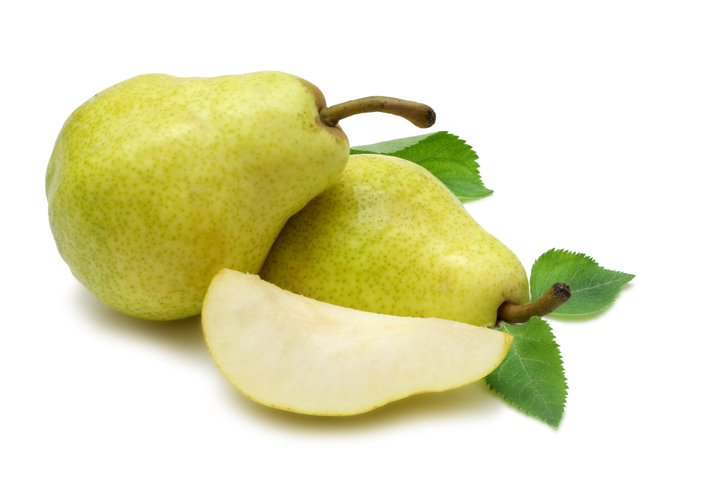 More than good taste, a pear is an incredibly versatile fruit. You can put in or on just about anything to add a bit of sweetness, crunch, or citrus. It also packs a powerful nutrition punch. Pears are an excellent source of fiber and a good source of vitamin C. They are low in calories, sodium-free, fat-free and cholesterol-free. Eating a variety of fruits—including pears--is part of the foundation for a healthy lifestyle.
More than good taste, a pear is an incredibly versatile fruit. You can put in or on just about anything to add a bit of sweetness, crunch, or citrus. It also packs a powerful nutrition punch. Pears are an excellent source of fiber and a good source of vitamin C. They are low in calories, sodium-free, fat-free and cholesterol-free. Eating a variety of fruits—including pears--is part of the foundation for a healthy lifestyle.
Here are 5 more reasons why you should eat a pear every day.
1. Weight Management
Studies suggest that adding pears to your diet aids weight loss. In a study women who ate three pears or three apples every day had more weight loss compared to women who ate very little fruit. Likewise, women eating fruit had a greater reduction in calorie intake overall, likely due to greater satisfaction after eating. Eating 3 servings of fruit per day may decrease your overall daily food intake.
Another study showed that eating 3 pears or apples every day satisfies better than eating cookies that have the same amount of calories and fiber. Women added 3 oat cookies, 3 pears, or 3 apples to their daily diets for 10 weeks. The women eating the pears or apples significantly decreased calorie intake and lost more weight than the women eating cookies.
2. Gut Health
A healthy gut is key to a healthy immune and nervous system. Pears contain prebiotic fiber that helps promote intestinal health by providing food for beneficial probiotic bacteria. As fiber travels through the digestive system it acts like a sponge, absorbing water and removing waste and toxins. Pears are one of the leading fruit sources of fiber. One medium-sized pear packs 6 grams of fiber. That's about 24 percent of the recommended daily intake of fiber. The majority of the fiber in pears is in the skin, so be sure to enjoy the skin.
3. Cancer Prevention
Colorectal cancer is the second leading cause of cancer death in the United States. In a study comparing people diagnosed with colorectal adenoma (growths) to those with no diagnosis, researchers found fruit and vegetables to be somewhat protective, but the strongest protection came from fruit. Those who ate almost 6 servings of fruit daily had 25 percent less risk of colorectal adenoma compared to those who ate just one serving of fruit daily. Researchers believe fiber, as well as other nutrients in fruit, play a protective role against cancer development.
4. Heart Disease
Pears are a heart healthy food. They are a sodium-free, fat-free, and cholesterol-free, a good source of vitamin C and are rich in fiber. Researchers have found that pears and apples are the most protective against heart disease, compared with other common fruits. There are many factors such as diet, activity level, age and genetics that contribute to heart disease. However, according to the American Heart Association, eating more fruits and vegetables may also help fend off a heart attack or stroke.
5. Hypertension
Lifestyle changes such as exercising, eating more fruits and vegetables, decreasing sodium while increasing potassium are helpful when it comes to blood pressure. Also, weight loss—if you are overweight, may reduce blood pressure. Pears are a good source of potassium. Eating foods rich in potassium tend to reduce the bad effects of sodium on blood pressure. And replacing high-sodium, high-calorie foods in your diet with low-calorie, sodium free foods such as pears can help reduce sodium intake even more.
 Constance Brown-Riggs, MSEd, RD, CDE, CDN is a registered dietitian, certified diabetes educator, national speaker and author of The African American Guide to Living Well with Diabetes.. She is Dannon One Yogurt Every Day Nutrition Advisor.
Constance Brown-Riggs, MSEd, RD, CDE, CDN is a registered dietitian, certified diabetes educator, national speaker and author of The African American Guide to Living Well with Diabetes.. She is Dannon One Yogurt Every Day Nutrition Advisor.









